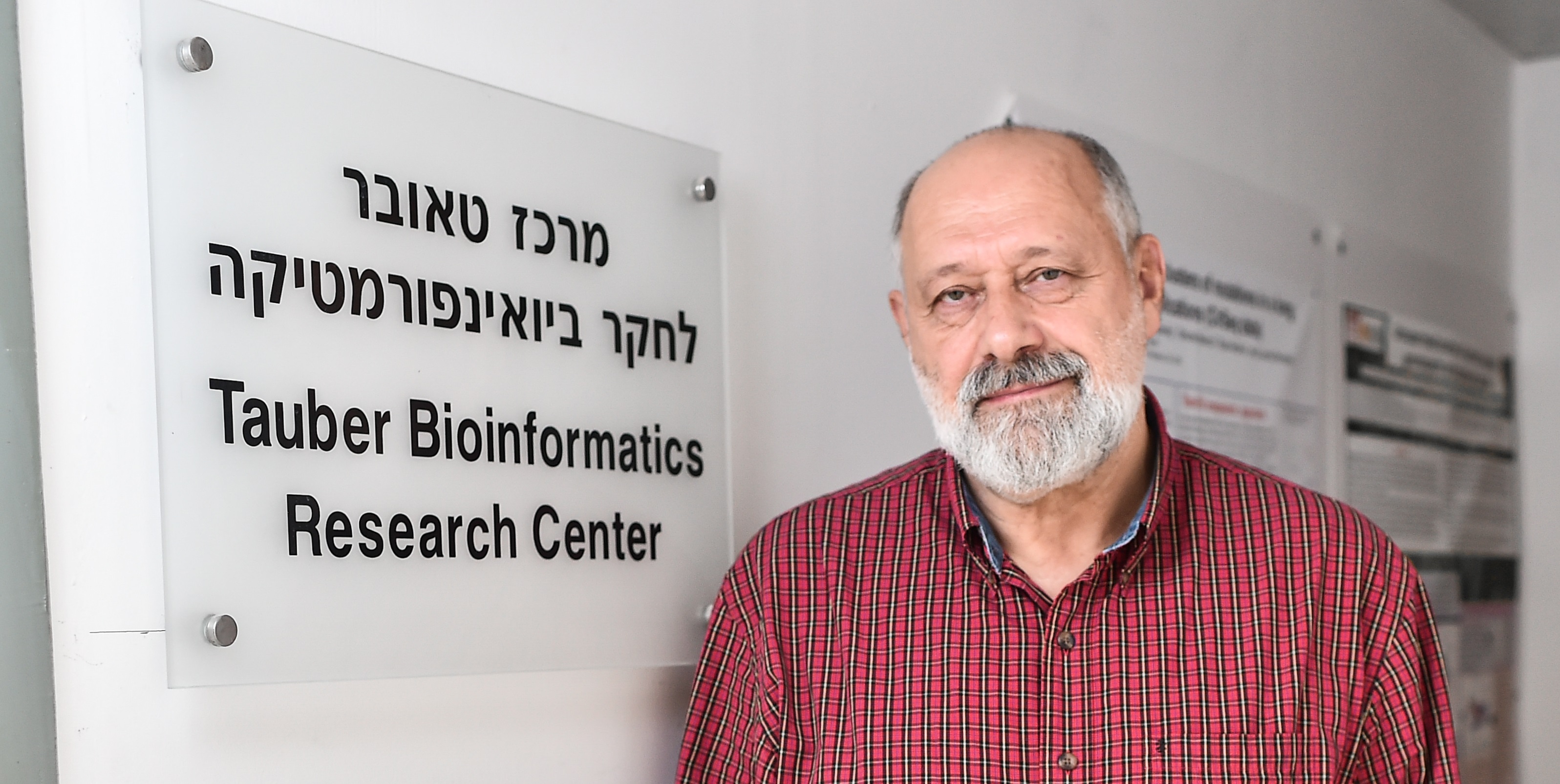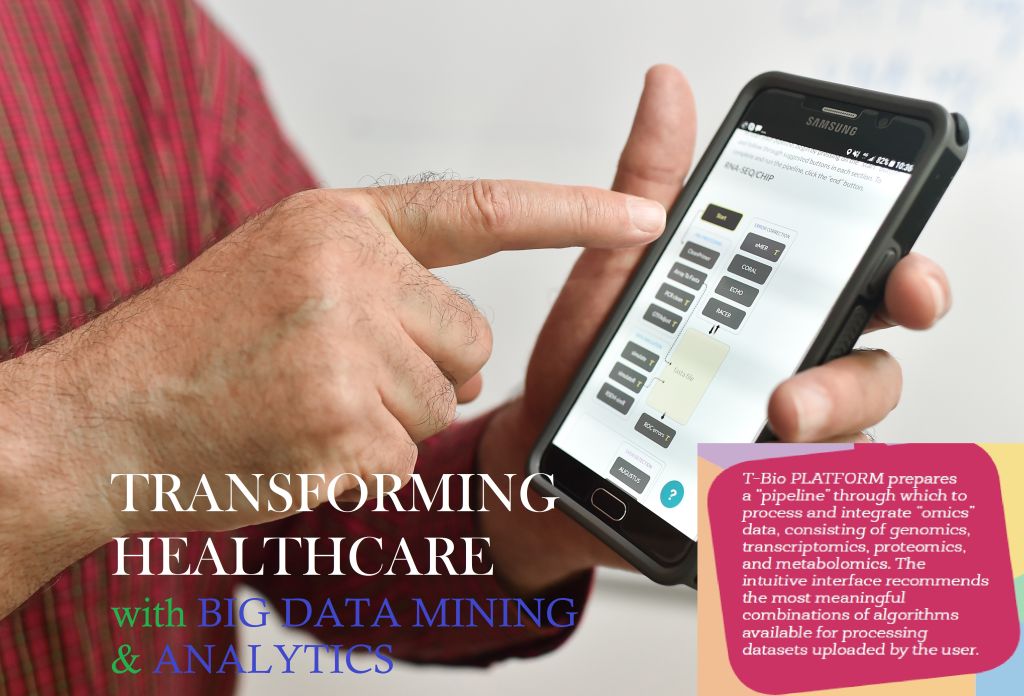TRANSFORMING HEALTHCARE
with Big Data Mining
& Analytics
Scientists at The Tauber Bioinformatics Research Center (TBRC) are analyzing massive volumes of biomedical data to accelerate
the development of new drugs and pave the way for personalized medicine.
Big data is much more than just a buzzword. When harnessed correctly it becomes a powerful resource for understanding molecular
and cellular mechanisms, with enormous potential to transform our approach to healthcare and enhance quality of life. From treating
diseases to enhancing the nutritional quality of plants, the analytics of multi-omnics data - genomics, transcriptomics, proteomics,
and metabolomics − is increasingly being used for research, diagnosis, and treatment in the fields of molecular biology, biochemistry,
cell biology, or clinical/pre-clinical research.
Established with the generosity of the Laszlo N. Tauber Family Foundation, TBRC is developing computational solutions to ease and
streamline multi-omics data analysis and integration. “We use our powerful multi-omics analysis platform, T-BioInfo, to simplify bio-
informatics and enable biologists to participate in the discovery of molecular diagnostics, small molecules, vaccines, and advanced
medical treatments,” explains Prof. Leonid Brodsky, TBRC Director. “Our goal is to equip biomedical researchers and clinicians
with a simple and intuitive platform that enables faster and easier analysis, integration, and visualization of big biological data. With
the assistance of T-BioInfo, biologists and medical researchers will be able to advance the field of precision medicine and enhance
personalized healthcare as well as discover new drugs.”
Under the leadership of Prof. Brodsky, the Center’s team consisting of mathematicians, biologists and programmers are developing a
world-class, proprietary solution being used in research laboratories across the globe. The T-BioInfo platform became so successful
that it led to the establishment of Pine Biotech, a bioinformatics start-up company. Established under the auspices of Carmel-University
of Haifa Economic Corp., the University’s technology transfer organization, Pine Biotech is working with prestigious academic medical
enters and universities including the Mayo Clinic, UCSF, Stanford University, Boston University and Penn State University.
TBRC is also engaged in projects with governmental agencies in the United States. Following the successful completion of a four-year
virology project with the Defense Advanced Research Projects Agency (DARPA) of the United States Department of Defense, the Center
was invited to participate in a new four-year DARPA virology project called The INTERCEPT Program for Bio-defence Countermeasures.
In addition to bioinformatics data analysis, it will perform mathematical modeling and simulation of virus-host interactions for RNA positive
strand viruses (such as Polio, Dengue, Chikungunya, and West Nile virus). The goal of the project is to explore and develop a new therapeutic
platform that could slow down the spread of viral epidemics, through the introduction of virus-based therapeutic particles that disrupt the
viral infection.

(l-r) Prof. Leonid Brodsky and Prof. Fred Tauber at the opening ofTBRC’s new office, located on the University of Haifa campus.
“Discoveries already made in the field – mainly stemming from research labs − are just the start of a big data revolution. The challenge is to enable a
wider range of researchers and clinicians to take advantage of these new resources,” relates Prof. Tauber. “We envision our user-friendly T-BioInfo platform
as a smartphone-like interface in the hands of practical medical workers and non-bioinformatician biologists, allowing them to take advantage of the power
of big data.”
 Prof. Leonid Brodsky, founding Director of TBRC, has been a leading expert in bioinformatics research, computational biology and systems biology modeling for over 30 years. He holds multiple leadership positions in academic and commercial settings.
Prof. Leonid Brodsky, founding Director of TBRC, has been a leading expert in bioinformatics research, computational biology and systems biology modeling for over 30 years. He holds multiple leadership positions in academic and commercial settings.
Further Reading:
Finance and Behavioral Economics Research Center (FiBER): Harnessing Real-Life Data to Understand Investment Behavior
Cyber, Law and Policy Research Center: Spearheading Israel’s Legal Strategies in New Digital Ecosystems
Edmond J. Safra Brain Research Center for the Study of Learning Disabilities: Investigating Early Literacy in Hebrew and Arabic Languages to Help Kids Reach Their Full Potential


